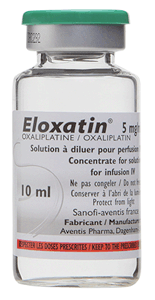Warnings & Recalls for Eloxatin
Before taking
Eloxatin, tell your doctor if you are
allergic to any medications, especially oxaliplatin, carboplatin, or cisplatin. Also let your doctor know if you have:
- a history of kidney or liver disease
- asthma or any other breathing disorder
- a nerve disorder
- been taking any other medications (especially blood-thinners), vitamins, supplements or herbal products
- any scheduled surgery, including dental work
Eloxatin may
decrease blood cells and
reduce the immune system's
ability to fight against an infection. Avoid contact with sick people while taking Eloxatin.
Side effects of Eloxatin may be
increased in the presence of
cold air or objects. If you are taking Eloxatin,
do not consume anything cooler than room temperature, touch any cold objects, go near air conditioners, refrigerators or freezers, use cold water for washing hands or bathing, or go outdoors if it is cold. This precaution should be followed for
five days after each injection. If you must go outside in the cold, use proper protection to keep your entire body warm. Use gloves if you need to handle any cold objects. Stay away from ice.
Eloxatin and Pregnancy
The
U.S. Food and Drug Administration has labeled Eloxatin as a
pregnancy Category D. Eloxatin
can harm the fetus in a
pregnant woman taking this medication. It is
unknown if Eloxatin passes through breast-milk to a nursing baby.
Do not take Eloxatin if you are pregnant, planning to become pregnant or are breastfeeding without consulting your doctor first.
Eloxatin Treatment and Use
Eloxatin | Oxaliplatin is a platinum-containing antineoplastic agent medication marketed by Sanofi-Aventis for treating advanced stages of colon or rectal cancers. Eloxatin is commonly used during chemotherapy in combination with other cancer fighting medicines such as leucovorin to maximize benefits.
Eloxatin may be used in patients who are undergoing surgery to remove a colon cancer tumor, and preventing the cancer from spreading any further.
How Does Eloxatin Work?
Cancerous cells use DNA to grow and spread throughout the body. Eloxatin prevents this from happening by binding cells together, destroying the DNA, and stopping the multiplication of these cells. Eloxatin can also affect blood cells in a similar way and slows reproduction of these vital cells.
Consequently blood tests may need to be taken to ensure safety and healthiness among patients.
How is Eloxatin Given?
Eloxatin comes in a powder and liquid form for intravenous injection administered by a doctor or nurse who has experience in the chemotherapeutic field. Infusional 5-fluorouracil or leucovorin is commonly given during treatment with Eloxatin. Typically, patients are injected with Eloxatin once every two weeks. Doses and frequency may be adjusted depending on the patients response to the medicine. Duration of the injection and length of treatment depends on the patients medical condition.
You may be asked to have your liver and kidney function checked regularly to monitor your body’s health while taking Eloxatin.
